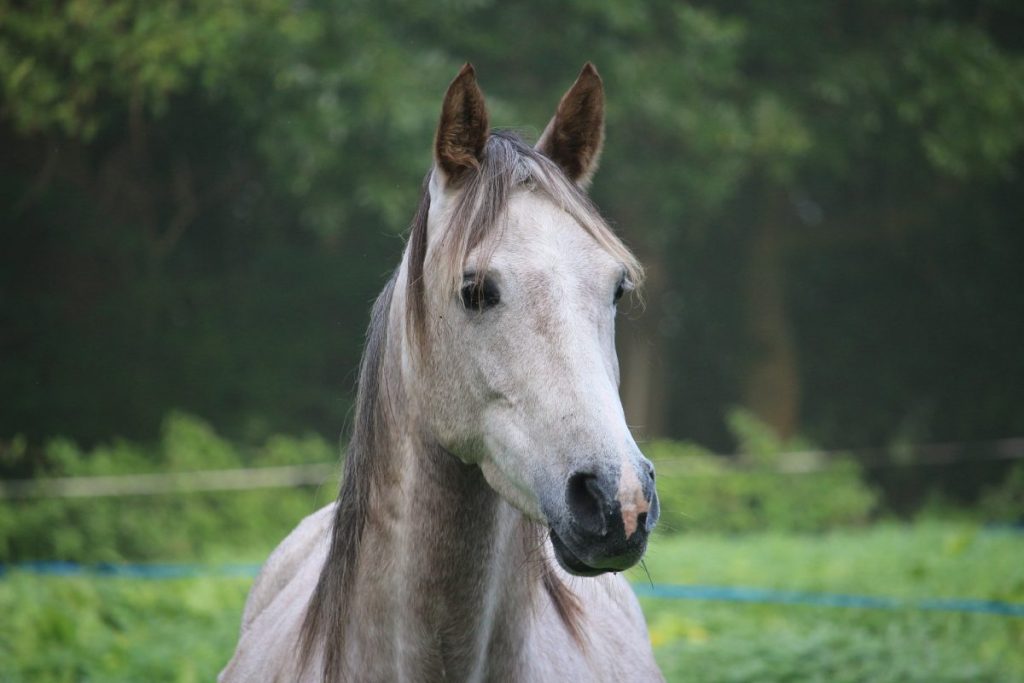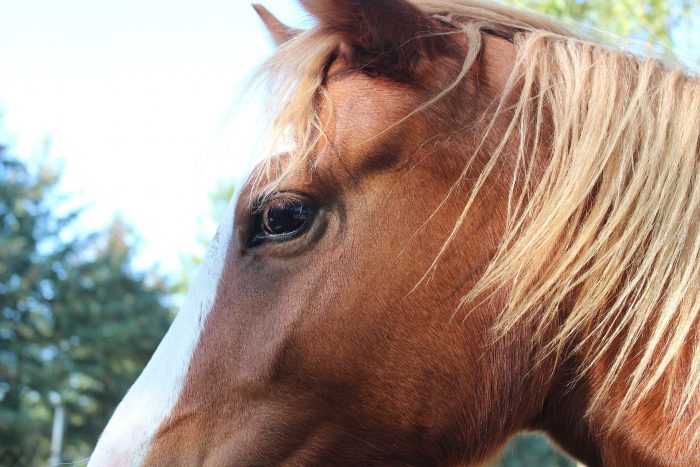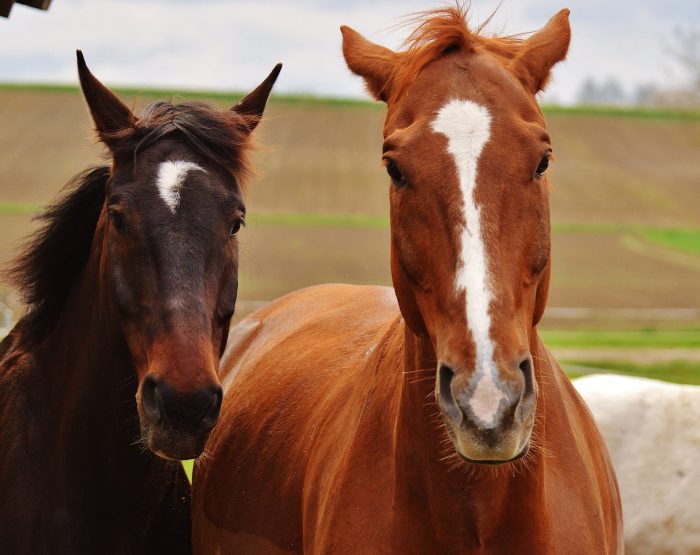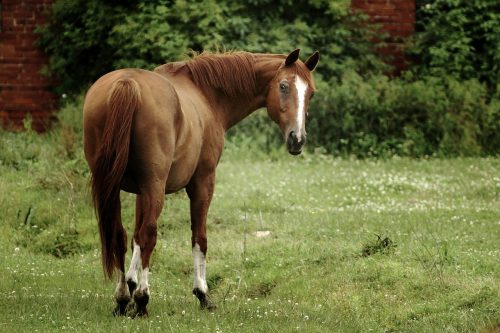Put in simple terms, equine colic is abdominal pain. The word colic means ‘abdominal pain’. Colic is a common digestive disorder, yet sadly is one of the leading causes of deaths related to medical conditions in horses.
Unfortunately, because the term colic has become broader in its definition over the years, it’s now a term used to refer to a wide variety of digestive health issues that can vary in degrees of severity.
There are over 70 and counting mild to life-threatening intestinal problems that cause colic in horses. Fortunately, though colic is still a common cause of death, prognosis today is much better than it was several years ago. This is because of advancements in treatment and diagnosis, as well as better drugs and surgical techniques.
However, early diagnosis and sometimes surgery remains a horse’s best chance of survival, even today. Especially when it comes to more serious episodes of colic. Colic in horses typically presents as severe abdominal pain.
Your horse may display this pain by pawing, rolling on the ground, and even sometimes display an inability to poop. Regardless of symptoms, it’s important that all forms of colic, from minor to severe, be treated with the same sort of urgency. This is a condition that can be life-threatening without quick and proper treatment.
Horse Colic Symptoms
Obviously, symptoms can vary quite a bit depending on the form of colic. However, some generalized symptoms include:
- Your horse wanting to roll
- Your horse wanting to lie down a lot
- Depression and anxiety
- Pawing at the ground
- Playing in the water bucket, yet not drinking the water
- Marked lack of appetite
- Abnormally high pulse rate
- Looking at the flank
- A lack of normal gut noises
- Weird postures
- Sitting
- Stretching
- Bloodshot eyes
- Extreme dullness
- Tail swishing
- Agitation
With gas or ‘spasmodic’ colic, the most common symptoms are:
- Frequent attempts to roll
- Loud gut sounds
- Sporadic gut pain
- Sweating
- Restless and anxious behavior
With impaction colic, your horse may:
- Have no fecal production
- Suffer from an impacted colon
- Display a reluctance to eat
- Have extended periods of lying down
- Suffer from chronic abdomen pain
- Present with dark mucous membranes
- Experience a drop in temperature as the disease progresses
In milder cases colic is characterized by:
- Restlessness
- Lip curling
- Flank watching
- Pawing the ground
In more moderate cases, your horse may:
- Lie down and get back up
- Lie on their side for long periods of time
- Posture to urinate frequently
With severe cases of colic, your horse could engage in:
- Violent rolling
- Rapid breathing
- Sweating
- Suffer injuries to their face and body from thrashing and rolling.
Types of Horse Colic
Spasmodic or gas colic – This is essentially pressure and inflammation along the gastrointestinal line that is triggered by excess gas or fluid, causing the smooth muscle of the intestine to contract painfully. Excess gas or fluid may be caused by food fermenting and building up in the digestive tract. This type of colic is similar to indigestion in humans, and typically isn’t life-threatening.
Idiopathic Colic – Means there is no root cause known and this is true for about 80% of colic cases. Thankfully, about 95% of these cases recover just fine.
Non-idiopathic Colic – Means the cause of colic is known.
Enteritis – Is an inflammation of the intestine caused by things like viruses, bacteria, and infection. Sometimes a horse may suffer from diarrhea. This type of colic is much harder to diagnose and could even resemble impaction or displacement colic.
Intussusception – Is a type of colic is caused by parasites and tapeworms. It’s when the large intestine essentially folds in upon itself. This form of colic is especially dangerous, because a section of the intestine slips back on itself similar to the way one might close a telescope. This can lead to a cut off in the blood supply and create a blockage.
Stomach distention – This sometimes happens if your horse eats large amounts of food or greenery at one time. A horse’s stomach is quite small, so it’s prone to distention. When dissension occurs, a rupture can occur, and a rupture can be fatal.
Displacement colic – The small intestine basically floats free in the gut. Because of this, it’s easy for the small intestine to become twisted. When a small intestine is twisted, emergent immediate surgery is required to untwist and reposition the organ, and remove damaged portions of dead tissue.
The dead tissue is the result of restricted blood flow during the displacement. Displacement colic can occur in both the large and the small intestine in the abdominal cavity, and cause pain and restrict blood flow. Displacement can also be a result of a buildup of gas in the gut, causing the intestines to move around inside the abdominal cavity.
Gastric rupture – Is a rare form of colic that usually occurs when an impaction builds up and reaches the horse’s stomach, causing the stomach to extend.
Strangulation/Torsion – means there is a twist in the small intestine or colon which can cut off blood supply and kill the tissue. This is considered one of the most lethal types of colic.
Impaction colic – This can be related to dehydration and the accumulation of foreign matter in the colon, like sand, or coarse feed. Impaction colic is sometimes referred to as sand colic, especially prevalent in sandy areas and with horses fed on a sandy ground.
Causes of Horse Colic
With gas or spasmodic colic, an accumulation of gas in the colon is what triggers acute pain. With impaction colic, it could be due to dehydration. For instance, your horse may not be drinking enough fluids to keep things moving properly.
Sometimes an impaction can be due to a colony of internal parasites, or an excessive ingestion of sand. Sometimes stones in the digestive tract and even benign fatty tumors in the gut can restrict proper gut flow and result in an impaction.
Other causes colic include:
- Low ‘forage’ diets
- High grain-based diets
- Tainted and/or moldy food
- Abrupt food changes
- Long-term use of NSAIDs
- Dental problems
- Stress
Sometimes your horse may suffer from conditions not related to the intestine that cause abdominal pain, such as bladder stones, laminitis, and ovarian problems. These conditions can mimic symptoms of colic in a horse, and because of that is sometimes dubbed as ‘false colic’. However, these conditions can all still be quite serious so make sure you call your vet.
How is Horse Colic Treated?
When treating colic, it’s vital to understand the cause if at all possible. However, it can be hard at times to determine what is causing colic in your horse. Unfortunately, the severity of symptoms doesn’t always translate into severe colic. Symptoms don’t always match up, making proper diagnosis and treatment challenging.
In many cases of colic, your horse can be treated using medication. In cases of severe twisting of the intestine or heavy impaction, your horse will likely need immediate surgery. If you suspect your horse is suffering from any form of colic, you should call your vet immediately. While you wait for the vet, observe and monitor your horse carefully.
As a responsible horse owner, it is important that you become adept at taking your horse’s vital signs, such as their respiratory rate, heart rate, and checking the color of their mucous membrane so that you can relay that info to your vet. You should also make yourself familiar with the signs of colic so that you can know when your horse is suffering or when it’s a false alarm.
One smart idea is to invest in a stethoscope to keep in your barn’s first aid kit, because it can aid you in listening to your horse’s gut sounds. Obviously when your vet shows up they will check these things themselves, as well as quiz you on all your horse’s recent signs, symptoms, and behaviors, but it can’t hurt to learn how to do these simple tasks as well.
Your vet may or may not choose to sedate your horse, depending on the situation and the horse. If they think it will make your horse more comfortable then that may be the best route to take, especially if invasive diagnostics are required.
When your vet performs a rectal exam, they feel the large colon with their hands to see if there are any sections that feel distended due to gas buildup or if there are any areas that are twisted. Your vet may also use the nasogastric tube. These tubes are used to administer medications and water, mineral oil, and electrolytes.
Other diagnostic treatments that some vets use is the ‘belly tap’ or abdominocentesis, which is a procedure intended to collect and thoroughly analyze the fluid in your horse’s abdominal cavity. In some cases, your vet may need to administer pain medication like Banamine to control severe pain. If your horse is in shock or dehydrated, fluids by IV may become necessary.
In the case of impaction, your vet may use a laxative or mineral oil to help dislodge it and get it moving. Once the horse has defecated, he may be given food once again because defecation means the impaction has passed.
In the case of twisted bowels, when surgery becomes necessary, outcomes can vary based on the age and condition of the horse, how long they’ve been suffering from the colic, as well as the exact location of the problem within your horse’s digestive tract.
Preventing Horse Colic
Oftentimes colic cannot be prevented. However, that doesn’t mean you can’t do your best and try.
Here are some tips in preventing colic in horses:
- Keep fresh, clean water readily available for your horse. Even mild dehydration can increase your horse’s risk of colic. This is especially true when it comes to older horses. Make sure you warm the water slightly during cold winter months to entice them to drink more of it.
- Feed from a bucket or trough, and avoid feeding from the ground or sandy locations. You want your horse ingesting as little sand as possible.
- Watch their diet. They only need pelleted feeds and grain as-needed. Give them lots of opportunities to consume grass and hay, and put them out to pasture frequently.
- Keep an eye on parasites and make sure your horse is being treated for them regularly.
- Keep your horse’s teeth in good health, so they can adequately chew their food and roughage.
- If you change anything in your horse’s care, feeding routine, or exercise routine, make sure you watch them carefully for a couple of weeks after. Frequent changes can lead to horse colic, especially if they are abrupt changes.
At the end of the day, you know your horse best. Owners who keep careful watch over the horses in their care and monitor their diet and behavior closely find they experience fewer instances of colic.







